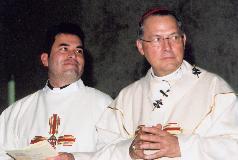When people my age get together, inevitably someone mentions a relative or friend diagnosed with a serious illness – or who died without warning. I had such a conversation with my sister, brothers and in-laws a while back. One of our cousins, we learned, sustained a severe heart attack. A neighbor, in her late forties, went to bed early because of a headache. A cerebral aneurysm took her during the night. We tried to distance ourselves by analyzing the causes: Was it heredity? Bad diet? Lack of exercise? Refusal to see a doctor?
As we talked our oldest brother, a pharmacist, spoke up. “Those things are just normal,” he said. We smiled because he is known for expecting the worst. Still we could not dispute his statement, especially since he spends long hours distributing remedies to cure illness and forestall death. Better than the rest of us, he knows medical miracles have limits. In spite of advances in hygiene, nutrition and medicine, we have not extended life much beyond the biblical norm: “Seventy is the sum of man’s years – or eighty if he is strong.” (Ps. 90:10)
Deal Hudson, editor of Crisis Magazine, wrote an incisive article, The Dearth of Tragedy. Much of modern moral confusion, he maintains, comes from the loss of the “tragic sense” of life. All of us must face sickness. Each one must die. For Christians those realities are part the cross.
We constantly look for ways to avoid the cross, even in its inevitable forms like sickness and death. Who wants to suffer? Fearing the cross is one thing – Jesus himself trembled – but outright rejection brings terrible consequences. To reject suffering in principle, to not see it as redemptive, leads to de-humanization.
That degradation eats away at our society. In our eagerness to find cures for diseases, the majority of Americans are now willing to sacrifice human embryos. With a certain naiveté, the same people will say they want to draw the line at cloning. But once you have assented to manipulating human embryos, you have no grounds to object to cloning. Think about it. In spite of present repugnance to the idea, it requires no change of logic to move from experimenting with embryos to cloning humans for body parts. If, like my friend Fr. Mike Holland, I were to contract liver cancer, would it not make more sense to grow a replacement from a genetically identical embryo? What difference does it make, morally, whether the new human is my twin? But God help me if, for a few more years on earth, I were to bring a person into existence in such a way and for such a purpose.
Those who favor using human embryos for research, accuse us of prima facie hypocrisy: “Your religious dogmas about embryos are fine, but what if it were your own parent, spouse or child who was dying?”
I am thinking right now about someone I love dearly – a four-year-old child. If she became gravely ill, I pray I would have strength to say, “Melany, I want you to be well and to see you grow into a young woman. But even more I want us to both be in heaven one day. That is how much I love you. May neither of us cling to this passing life more than we do to Jesus.”
Jesus puts it on the line today:
Even admitting that “hate” means, “love less” these are strong words. Yet, unless we place Jesus first – above all things and all people - we will not discover who that other person really is nor will we know true self. Only by loving him will we rightly love all our brothers and sisters, including the smallest and most defenseless.
**********
From Archives (23rd Sunday, Year C):
Bulletin (stategic plan, Germaine Greer on birth control)
Seapadre Homilies: Cycle A, Cycle B, Cycle C
Other Homilies
Proclaiming the Gospel (Foto by Marry-Natty)
Seattle Columnist Joel Connelly Responds to Anti-Catholic Stereotyping: "On issues from AIDS to stem cell research, Catholic teaching and 'the Vatican' get described as medieval obstacles to 21st century progress. Archbishop Alex Brunett is wondering whose agenda and what purpose is being served."
Smelt Fishing with Fr. Jim Coyne (Sept. 3, 2001)
Catholic Evangelization and Dissent by Fr. Jim Northrop (well worth reading!)
Germaine Greer on Birth Control
